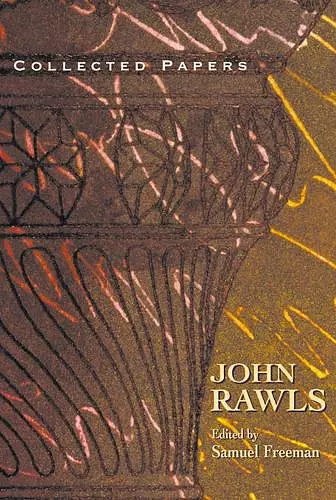Collected Papers
John Rawls author Samuel Freeman editor
Format:Paperback
Publisher:Harvard University Press
Published:1st Apr '01
Currently unavailable, and unfortunately no date known when it will be back

John Rawls’s work on justice has drawn more commentary and aroused wider attention than any other work in moral or political philosophy in the twentieth century. Rawls is the author of two major treatises, A Theory of Justice (1971) and Political Liberalism (1993); it is said that A Theory of Justice revived political philosophy in the English-speaking world.
But before and after writing his great treatises Rawls produced a steady stream of essays. Some of these essays articulate views of justice and liberalism distinct from those found in the two books. They are important in and of themselves because of the deep issues about the nature of justice, moral reasoning, and liberalism they raise as well as for the light they shed on the evolution of Rawls’s views. Some of the articles tackle issues not addressed in either book. They help identify some of the paths open to liberal theorists of justice and some of the knotty problems which liberal theorists must seek to resolve.
A complete collection of John Rawls’s essays is long overdue.
What a body of work this is, and what an accomplishment. Collected Papers affords an opportunity to step back and see [Rawls's] work as a whole, as the elaboration of a single powerful and abiding idea...The other thing these papers show--and for this we should be grateful to Sam Freeman's persistence in having them republished--is how hard-won Rawls's achievement has been... This volume of Collected Papers stands as an inspiration to the next generation of theorists. -- Jeremy Waldron * London Review of Books *
The course of Rawls's career can be followed clearly in the Collected Papers, whose twenty-seven chapters span forty-eight years...The writings of John Rawls, whom it is now safe to describe as the most important political philosopher of the twentieth century...owe their influence to the fact that their depth and their insight repay the close attention that their uncompromising theoretical weight and erudition demand. -- Thomas Nagel * New Republic *
[John Rawls] has, among other things, rescued an endangered academic practice, the serious and disciplined study of the great issues of public values by professional philosophers, from imminent extinction and given a remarkable exemplary display of how to devote an entire intellectual life to the patient, frank and indefatigable study of a single great intellectual problem. His Collected Papers, naturally, covers the whole of that life, from two decades before he published his masterpiece, A Theory of Justice, in 1971 to more than 25 years later. -- John Dunn * Times Higher Education Supplement *
The publication of this book is an important event. Since the appearance of Rawls's epoch-making A Theory of Justice in 1971, he has been acknowledged as America's-perhaps the world's--leading political philosopher...The story of 'How John Rawls Revived Political Philosophy and Rejuvenated Liberalism' is part of academic legend...Rawls is a sophisticated and ambitious thinker. His arguments are informed by a deep sense of history and draw on an array of different disciplines...Rawls also did the index to A Theory of Justice and it is a masterpiece of the art. Rawls's thoroughness, indeed, is the stuff of legends. -- Ben Rogers * Prospect *
In 1971, Rawls published A Theory of Justice, which has come to be generally regarded as the century's major systematic work of substantive ethics and political philosophy; about 20 years later, in Political Liberalism, he examined issues arising from it. This collection includes nearly all of his published essays, beginning with the first (1951) and running to as recently as 1997 and an interview in 1998. It reveals his beginnings in utilitarianism and the dissatisfactions that led to his contractarianism and to his examination of such matters as public consensus in a pluralistic society, public reason, the compatibility of religious and comprehensive secular doctrine in a liberal society, commonality in human laws, Kant's moral philosophy, and more. These essays both clarify Rawls's thought and make significant contributions to their subject. -- Robert Hoffman * Library Journal *
[Collected Papers is] a nearly complete collection of Rawls's short essays from 1951 through 1998. What is arguably the most widely discussed political theory of the second half of the 20th century emerged from an evolutionary process. By making available in one volume the papers through which Harvard philosopher Rawls initially tried out his ideas, Freeman provides easy access to the steps taken along the way...What the reader will find in this volume are the starts and stops, the grappling with issues of moral philosophy, and especially later in his career, the confrontation with concerns such as religious belief that threaten the assumptions of rationality and the positive value of reasonableness upon which his vision of justice depends. A convenient and welcome compilation. * Kirkus Reviews *
Editor Freeman has assembled almost all the articles of 20th-century American philosopher John Rawls. Originally published elsewhere during the span of his career, these works together testify to Rawls's belief that a just society is an actionable idea. They anticipate his two most distinguished and influential works, A Theory of Justice and Political Liberalism...Freeman's anthology is exemplary and ought to appeal to a wide professional audience and the educated public. -- A. S. Rosenbaum * Choice *
ISBN: 9780674005693
Dimensions: unknown
Weight: 953g
672 pages